Piero Valmassoi, journalist and platform transport policy expert, asked the participants and supporters The Great Delivery, which finished on Friday, about their experience of the unique 400 kilometre protest, and their hopes and ambitions for improving the conditions of platform workers in Europe.
The Gig Economy Project is a BRAVE NEW EUROPE media network for gig workers in Europe. Click here to find out more and click here to get the weekly newsletter.
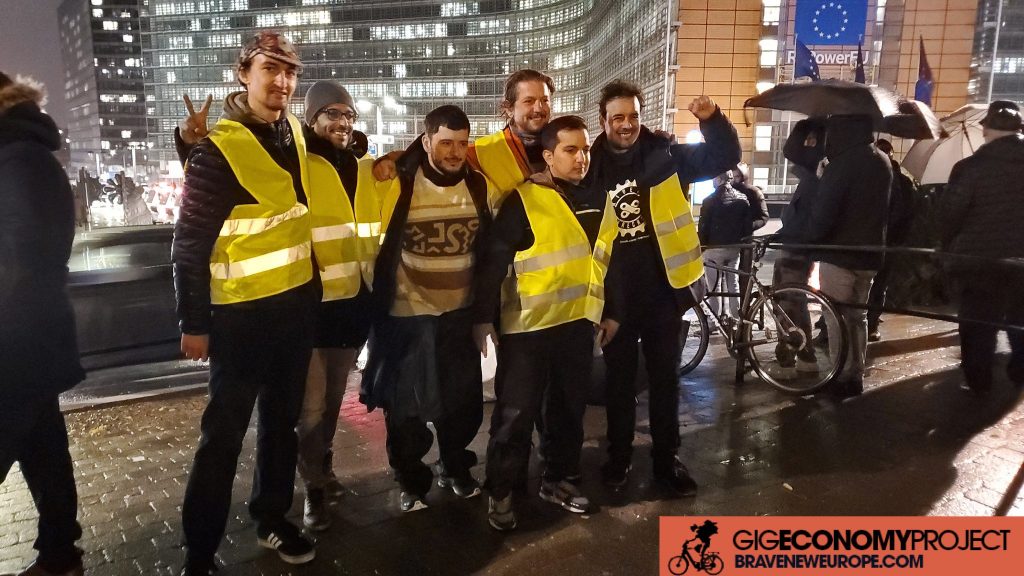
Five delivery riders from Belgium, France, Spain, Austria, and Italy, left Paris on 5 November and cycled for four days through rain and wind, before arriving in Brussels on 8 November to deliver their political demands to EU politicians, ahead of the ‘trialogue’ negotiations on the Platform Work Directive, which took place that evening.
This was the international initiative called The Great Delivery. Every day, riders stopped to meet and discuss with other workers subject to ‘Uberisation’, with the aim of building international solidarity and creating a bottom-up workers’ lobby, to challenge the lobbying of the digital labour platforms. The Great Delivery even received support from platform workers in South Korea.
The protest culminated in the ‘Don’t let Uber make the law’ demonstration in front of the European Commission building. After the demonstration, a delegation of riders and drivers, together with Leïla Chaibi MEP of The Left of the European Parliament, were received by the Commissioner for Jobs and Social Rights, Nicolas Schmit, in advance of the trialogue negotiations.
Riders and drivers were then welcomed by the Brussels House of Riders (La Maison des Livreurs), where they shared experiences from the previous days, discussed with other precarious workers, such as domestic workers, and prepared for the next steps of the struggle.
The Great Delivery ended on the afternoon of 10 November, with a commemoration for Sultan Zadran, delivery rider who died after a road accident in Brussels on 2 February. The investigation into his death was recently closed by the Brussels’ Public Prosecutor.
I spoke to some of the key participants and supporters of the The Great Delivery to find out why they did and what their hopes are for the Platform Work Directive and more.
Marcus Haunold, Riders Collective (Austria)
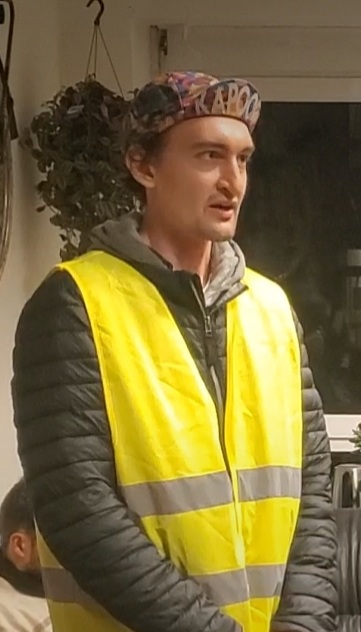
“What we are fighting for is not only about platform workers, it’s for the future of all workers. In Austria, we already have housekeeping and cleaning platforms that hire workers was false self-employed. If we don’t do anything in the future, it might be like this for every job.
“Even if we are working for platforms, we are workers and we want to be treated as such: we want to know how much money we will make at the end of the month; we want to be insured if we have an accident or we get sick; we want to have the right to get into a union, to change things for the better.
“As riders, we have currently better conditions in Austria than in other countries, as we were one the first countries in Europe to have a collective agreement at Lieferando (Just Eat). This guaranteed a pay of 9.5€/hour, 14 salaries a year, paid sick leave, paid holidays. “But it’s changing, especially with Foodora and Wolt: their riders are false self-employed and get paid by the order, they have no sick leave, no holiday, no choice of when to work, as you have to work when people order.”
Francesco Silvestri, Italian rider from Torino
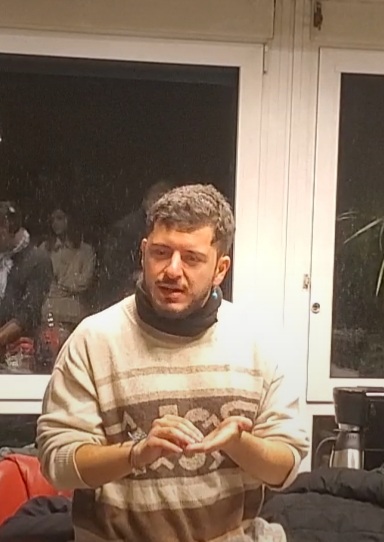
“It was very interesting to talk with different types of workers who are subject to Uberisation along the route of The Great Delivery. The issues we discussed are always the same with different workers in different countries because they all go back to the causes of all these problems: the wrong classification of workers through bogus self-employment and algorithmic management.
“After 30 years of precariat-isation, we are currently seeing something different in how society sees this work. Platform work is not only about food delivery, it is an economic model, which is recognised in more and more job sectors. We are seeing platforms engaged in not only economic but also political effort to question the 20th century model of subordinate work and the classic definition of worker, with all its basic rights. In this conception, you are just an individual who can provide a service, when and where it’s needed, but without any of the rights that were acquired in the last 150 years. Food delivery riders are just the tip of the iceberg: it’s the beginning of a new era where work is not anymore linked with salaries and social rights.
“Our question is: is it acceptable to continue to perform platform work in this way? How do we want to regulate it? And our answer is: in the most ambitious and radical way possible. Every worker is a subordinate worker unless the employer proves the opposite before a judge. This is because in the last ten years platforms have shown that they are wizards in violating laws.
“For this reason, in my opinion no EU directive is better than a bad directive.”
Camille Peeters, Collectif des Coursiers Bruxelles (Brussels’ Couriers Collective, Belgium)
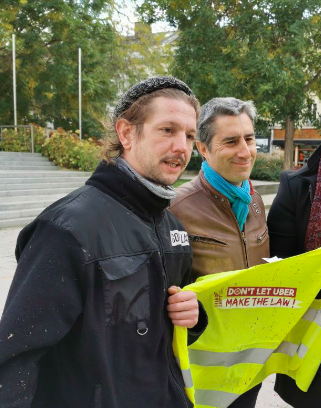
“We met Commissioner Schmit ahead of the trialogue and we told him that the initial proposal of the Commission and the Parliament’s report were ambitious texts that could really support platform workers.
“It’s now a matter of resisting the liberal forces represented by [French President] Emmanuel Macron, who wants to sabotage the Directive. We also expect that MEP Elisabetta Gualmini [European Parliament rapporteur for the Directive) will stand by her text and will not make compromises with platforms like Uber. It’s unacceptable to negotiate with the Council on the basis of their position, from which they are not willing to move an inch away.”
Brahim Ben Ali, Syndicat National INV (France)

“In February, we had a glimpse of hope with the Parliament’s proposal, but with the new Council’s compromise text, platforms are demanding permission to break the law. This is the moment to say enough is enough.
“We told Commissioner Schmit that he cannot let this go: even if there are a lot of people who want this Directive to be approved, we cannot have a bad compromise.
“I am sick of having to go before a judge and explain my situation: robo-firings, long hours, lack of social protection. Now it’s on the platforms to respect the law: if they want self-employed workers, they should act as intermediation platforms.
“At this point, it’s better no directive than a directive with criteria for presumption of employment. In that case, we will continue to go to court and win as we did already in France. It’s not going to be easy, but it will be easier than with a weak EU directive.
“Look what happens in France, where they created an authority in charge of social dialogue with an ex-Uber lobbyist, Bruno Mettling, as its head. I denounced this situation and the agreements that came out of this social dialogue, in response to which riders are currently striking in many French cities.
“During The Great Delivery, we met Uberised workers and politicians like François Ruffin, Member of Franch National Assembly, and Julien Poix, Regional Councillor of the Region of Hauts de France, who listened and welcomed our demands. This contributes to building a bottom-up lobby between elected officials and people who defend the most vulnerable, the invisible workers, who are also the most essential.
Felipe Corredor, RidersXDerechos (Riders for Rights, Spain)
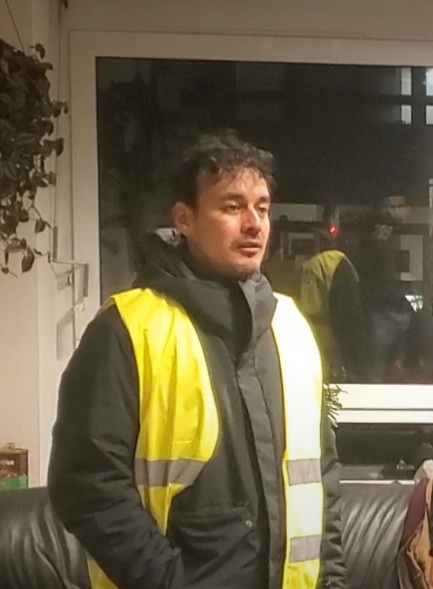
“We are demonstrating here for a general presumption of employment in the EU Directive, without criteria. Criteria make it easy for the platforms to escape the law, as we have seen in Spain with Glovo, which has been breaking the Riders’ Law for years.
“A general presumption of employment is the main instrument to defend the rights of workers, for which we have been fighting for a long time.
Martin Willems, United Freelancers union (Belgium)
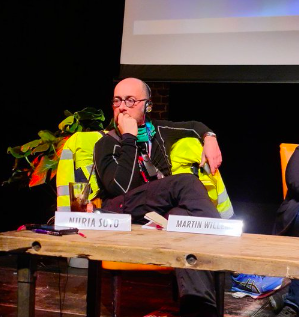
Brussels is everybody’s city, it’s the heart of Europe. We have been conducting so many years a terrible struggle against platforms that use all means at their disposal, as we have read in the Uber Files Inquiry report by the French National Assembly. Their attitude and their actions are outrageous, as is the lack of reaction by our politicians. But what gives me hope is that workers still are out there and resist.
Angèle, Ligue des travailleuses domestiques (League of domestic workers, Belgium)
“We need access to fair wages, to social protection, to training, to regular visas. We are now paid only 5€/hour.
“As the riders, we are fighting for our rights. We work in your houses, we live and eat with you, we work in retirement houses, we take your children to school.
“We want to be like all other workers, to have the right to be protected, especially as women. We suffer and we don’t have a voice: for this reason, we mobilised and we struggle to have our rights recognised.
“It’s the same struggle as for the riders and we will continue fighting, until we’ll make our voice heard by politicians.”
Hakan, delivery rider from Lille
Our pay decreases every three months, if not every month. Since 2019, we do not understand how platforms’ algorithms set tariffs, as when we compared them among riders they are never the same for the same delivery.
Our legal status is not clear: we don’t know whether we are employed or self-employed. Last week, I was connected to the app for 79 hours, I logged in 52 times and I did 44 deliveries: I earned €231.41. This is unacceptable, we don’t get to feed ourselves and our kids anymore.


Be the first to comment